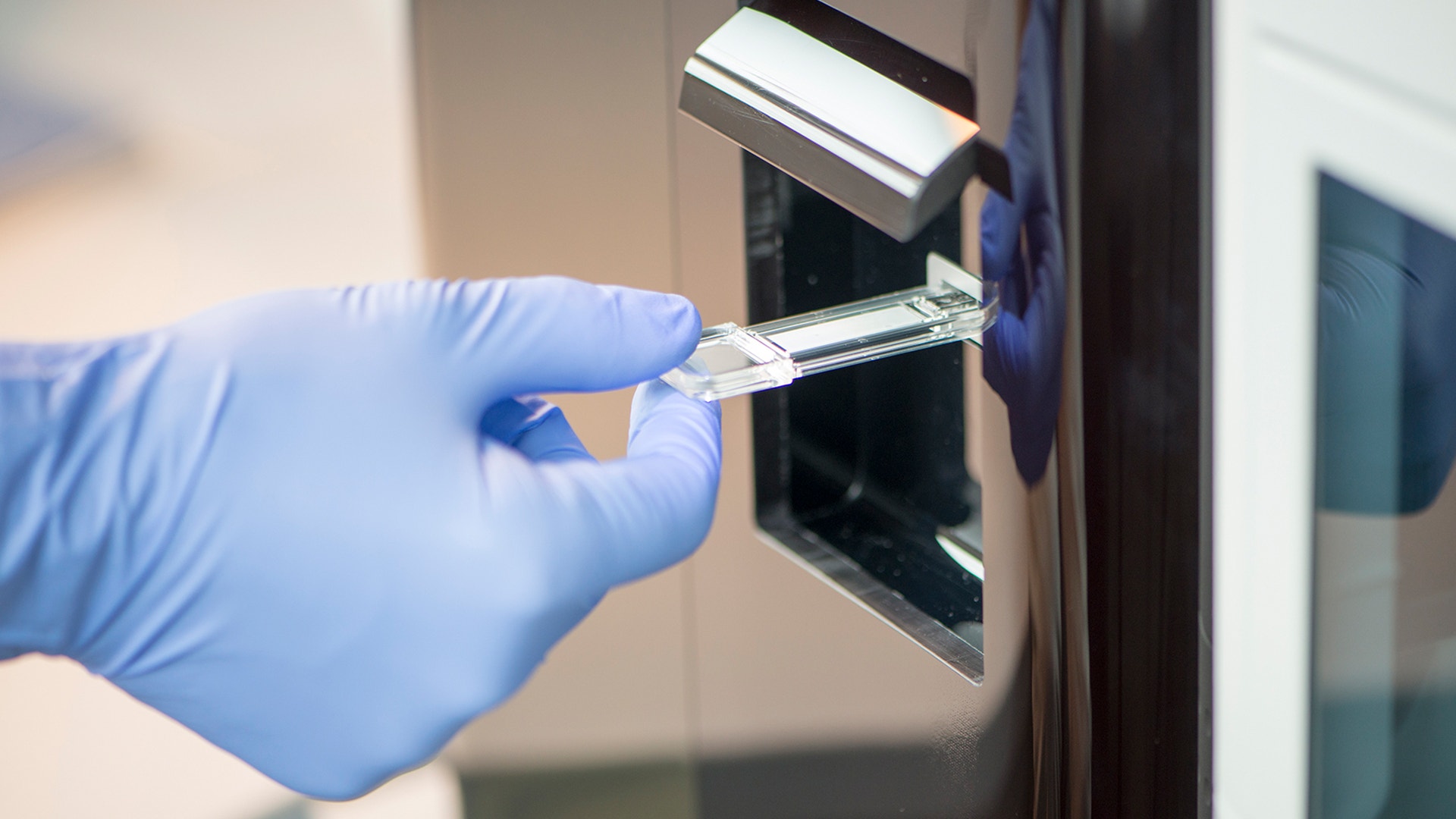Overview
Measure the toughest samples
The innovative fluidics design integrates all the microfluidics into the disposable cartridge (not within the device core) and places large bore standard valves downstream in the instrument instead of having microvalves near the chip.
By combining the microfluidics and optical biosensor in a single disposable cartridge, WAVEsystem, a Creoptix technology, offers crude-sample robustness normally only achieved with plate-based assays. Compatible sample types include 100% serum or plasma, cell lysates, crude membranes preparations, large drug targets, virus-like particles (VLPs), liposomes, and aggregates (fibrils) without clogging risk.
The chemical-friendly cartridge also makes it amenable to work with high concentrations of DMSO, acetonitrile, and other organic solvents typical of fragment libraries, and viscous detergents allowing exploration of solubilization and purification conditions for membrane proteins. And because the cartridges are self-contained and disposable, they eliminate cross-contamination protecting your samples and ensuring more reliable data.
No Microvalves for Fast Transitions
![[wave chip 1.png] wave chip 1.png](https://dam.malvernpanalytical.com/8bbd4c8c-6ca5-4e05-8186-ae6000b80268/wave%20chip%201_Original%20file.png)
The cartridge design enables ultra-fast transition times of 150 msec for reliable determination of off-rates of 10 sec–1 (half-life of 69 ms), enabling the kinetic study of weakly binding fragments.
No-Clog for Crude Samples
No-clog microfluidics accommodates a broad range of sample types to preserve activity and biological context, saving time from detrimental purification steps and clogging that takes other systems offline.
By combining the patented Grating-Coupled Interferometry (GCI) technology with no-clog microfluidics, the Creoptix® WAVEsystem deliver high quality data from even the most challenging sample types and achieve superior resolution in signal and time compared to other forms of label-free quantification. Label-free ligand immobilization is typically achieved by covalently coupling the ligand to the biosensor via naturally-occurring amine (-NH2), thiol (-SH2), aldehyde (-CHO) or carboxylate (-COOH) groups, or through ligand attachment to an antibody that has itself been covalently attached to the biosensor surface. Maintaining samples in native configuration and physiological conditions reduces the risk of protein inactivation or denaturation, ensuring the raw data generated is a faithful depiction of kinetic activity.
Which WAVEchip do I need?
![[Creoptix WAVE chip decision tree.png] WAVEchip decision tree v2.png](https://dam.malvernpanalytical.com/ef5d47b7-3fa2-4efa-8723-b2a6009413e9/WAVEchip%20decision%20tree%20v3_Original%20file.png)
Download the WAVEchip decision tree
-
- Additional information: WAVEchip types
-
WAVEchip sensor Sensor surface matrix Immobilization modality Suggested applications PCP Quasi-planar PC hydrogel Amine coupling Large ligands and/or analytes such as proteo-/liposomes, viruses, VLPs PCP-STA Pre-immobilized streptavidin
Quasi-planar PC hydrogelBiotin Large biotinylated ligands, analytes such as liposomes, viruses, VLPs PCP-RST Regenerable streptavidin surface
Quasi-planar PC hydrogelBiotin Large biotinylated ligands, ligand screening PCP-PAG Pre-immobilized fusion protein A/G
Quasi-planar PC hydrogelIgG For capturing the broadest range of IgG and FC-tagged proteins PCP-NTA Pre-immobilized NTA
Quasi-planar PC hydrogelHis-Tag Large His-tagged ligands, analytes such as liposomes, viruses, VLPs PCP-LIP Pre-immobilized lipophilic groups
Quasi-planar PC hydrogelLipid Hydrophobic (large) ligands such as liposomes, membrane vesicles PCZ Functionalized with a zwitterionic polymer bearing carboxylic acids and tertiary amines in similar densities, quasi-planar PC hydrogel Amine coupling Low fouling, ideal for coupling proteins with low isoelectric points or polyanionic ligands PCL Low capacity, thick PC hydrogel with a lower amount of negative charges (approx. 25%) Amine coupling Complex matrices such as serum, culture supernatant. Requires sulfo-NHS for activation PCH Thick PC hydrogel Amine coupling Large ligand-to-analyte molecular weight ratio, general purpose PCH-NTA Pre-immobilized NTA
Thick PC hydrogelHis-Tag His-tagged ligands, general purpose PCH-STA Pre-immobilized streptavidin
Thick hydrogelBiotin Biotinylated ligands, general purpose PCH-RST Regenerable streptavidin surface
Thick hydrogelBiotin Biotinylated ligands, ligand screening DXP Quasi-planar DX hydrogel Amine coupling Large ligands and/or analytes such as proteo-/liposomes, viruses, VLPs DXH-STA Pre-immobilized streptavidin
Thick DX hydrogelBiotin Biotinylated ligands, general purpose DXH Thick DX hydrogel Amine coupling Large ligand-to-analyte molecular weight ratio, general purpose PC- = polycarboxylate, DX- = Carboxymethyldextran.
DX coated sensors available upon request
Frequently asked questions
-
- What are WAVEchips® compatible with?
-
- 100% Serum & plasma & cell supernatant
- Non-traditional solvents, including high percentages of acetonitrile and DMSO
- Viscous detergents and additives to solubilize membrane proteins
- Cell membrane preps, partially solubilized, unpurified material
- Virus-like particles (VLPs), liposomes, or nanodiscs used as solubilization structures
- Large binding partners: nanoparticles and crude membrane preps
- How often can I use the WAVEchips?
- This depends on the type of WAVEchip®, the immobilization method used, and the behavior of the immobilized ligand. For example, His-tagged ligand proteins captured on a Ni-NTA surface can be regenerated by EDTA and the ligand freshly re-captured multiple times. This means that such a chip can generally be used repeatedly, provided it remains inserted in the WAVEsystem. Regenerations are possible with both Ni-NTA and Protein A/G chips, allowing for multiple uses, however this is not easily accomplished with streptavidin or other chips.
- How much ligand can you immobilize on the chips?
- The immobilization capacity depends on the chip type and immobilization method. The highest capacity chip in the WAVEsystem portfolio, the 4PCH WAVEchip, can immobilize up to 35,000 pg/mm2 of BSA, but the experimental capacity depends on the exact ligand used. The WAVEcontrol software has a built-in simulator that helps determine the ligand density required for an acceptable theoretical response.


